Alone in the Wilderness
Air Date: Week of October 31, 2008
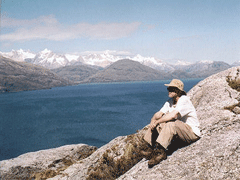
Kull sitting on a rock on a rare sunny day, a year after his year of solitude was complete. (Photo: Patti Kuchinsky)
Bob Kull lived on an island in Patagonia without seeing another human being for an entire year. He wrote a book about his experience called “Solitude: Seeking Wisdom in Extremes” and tells host Bruce Gellerman why he chose isolation.
Transcript
GELLERMAN: Have you ever been alone…I mean, really alone…for a long time? Well, Robert Kull has. In 2001, Kull set up camp on a remote island in the Patagonia wilderness, and he lived there, alone, for a year. Kull recounts his journey in his new book: “Solitude—Seeking Wisdom in Extremes” - and Robert Kull, welcome back to civilization, and to Living on Earth.
KULL: Thanks for inviting me, Bruce. It’s good to be here.
GELLERMAN: Gosh, a year is an awfully long time to live by yourself in the wilderness. Why Patagonia?
KULL: There’s nobody there. I considered the coast of British Columbia, but as I talked to people, I recognized there are a lot of boats and airplanes and kayakers and logging and mining. I’d come up the coast of Southern Chile several years before, there’s a ferry that plies the coast, and completely fell in love with it. It’s just amazing down there, it’s incredibly beautiful and on this ferry for three and a half days we went by one tiny little town. There were no airplanes, no other boats, no mining, no logging and I thought this is a place - this is remote enough that I could literally be here for a year and not see anyone.
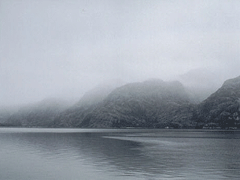
The pacific coast of southern Chile. (Photo: Bob Kull)
KULL: Oh yeah. No, absolutely. I’m not arguing to live in solitude forever. But it seems to me that we’ve gone overboard in some sense. That some psychologists argue that the only way to be human is through relationships with other people. So I find that to be fully human is not only about relationship with other people, but it’s about coming into a deeper relationship with ourselves and with the nonhuman world and with this mysterious presence. And for me, when I come into a deeper relationship with myself in solitude, it opens me more to being able to be in more profound and intimate relationship with other people when I come back.
GELLERMAN: But you weren’t alone. You had a cat.
KULL: Yeah, I did have a cat. It wasn’t my plan. I didn’t want to take a pet, that’s – it changes the dynamic to have a pet, and it wasn’t my intention at all. But the government officials in southern Chile told me that there was a lot of red tide there, and if I wanted to eat any shellfish, which I intended to, I needed to have a way of testing to see if they were poisonous. And I wouldn’t have access to the government reports, so what local people do is they use a cat as a guinea pig. They feed suspect shellfish to a cat, and if the cat dies, they don’t eat it themselves. But, of course, it didn’t work. We got very close, very quickly and instead of Cat testing shellfish for me, I was out catching fish for Cat.
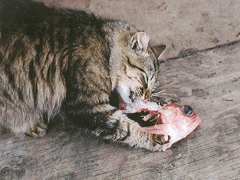
Bob Kull’s cat, “Cat,” eating fish that he caught for him. (Photo: Bob Kull)
KULL: Oh yeah. Yeah, it was a high tech trip. It was very different from other retreats into solitude. Often I go with a canoe and a tent and a fishing rod sort of a thing. And this time, one thing led to another. It was a very harsh climate, so I was gonna need a fair amount of firewood, and I thought, well, I need a chain saw, and I needed an outboard because all the wood had to come in by boat. And so, once I took that, that led to a whole bunch of other stuff.
GELLERMAN: Well, you go on this journey and you’re living alone in Patagonia, and I’m wondering, given the harsh conditions, does suffering enter into this? Was it the goal?
KULL: Oh yeah. Oh yeah. Yeah, there was a lot of pain. One of the interesting things is, I’m a wuss. I’m a real – I don’t like pain. Some people – I know people that just suck it up and – but I’m full of – my journal was just so full of whining about “oh, it’s so hard and I hurt ...” I fell hard a few times, and I tore the rotator cuffs in both shoulders and that’s a very painful injury. And so there were months when I was just in a lot of pain, and I couldn’t stop working, I had to – for survival I had to keep working. And then, later on I – there was emotional pain because I started seeing things about myself that I didn’t really like. One of the challenges and opportunities of solitude is this need to face yourself, there are no easy escapes.
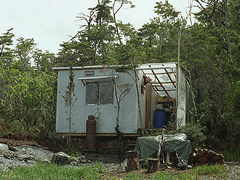
The cabin that Kull built on the island out of materials brought with him from the mainland. (Photo: Bob Kull)
GELLERMAN: Did you ever feel like you were going crazy?
KULL: Yeah. Yeah.
GELLERMAN: Did you go crazy?
KULL: I don’t know. [Laughs] I mean, who would notice? There’s that kind of feeling, you know.
[LAUGHING]
KULL: You have to be a little crazy to do something like this, right?
GELLERMAN: So your book – is about me reading it? Or is it about you writing it?
KULL: It’s about us journeying into solitude together. I didn’t want to just describe my own journey into solitude, but to invite readers to come there with me. And also to invite readers to reflect on their own lives wherever they’re living, because I don’t think it’s a particularly heroic thing to do, to go live alone in the wilderness for a year. I think that all our lives are heroic – if we live fully wherever we are, whether it’s raising kids or going to work. That’s an incredibly challenging process and it takes everything we’ve got. What we’re looking for we already have. I mean, this is the irony. You know, we keep looking for simple answers, we keep looking to spiritual teachers or psychologists - “well, just tell me what I have to do. Give me this 1, 2, 3 step to fix myself.” And I don’t think it works that way.
GELLERMAN: When you were out there on the coast on this lonely – well, alone – on this island, was there music in your mind?
KULL: Sometimes. Just short phrases. The Navajo beauty song came through my mind for a while, and Simon and Garfunkel “I am a rock, I am an island.” Especially when I was out in my boat on a calm day, standing in the front of the boat, just zooming through this unfolding universe, this expanding universe, on a glassy day.
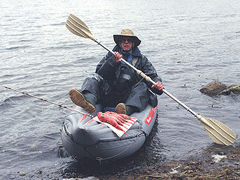
Kull in his Sevylor inflatable kayak. (Photo: Bob Kull)
GELLERMAN: Well, Robert Kull, I want to thank you very much. I really appreciate it.
KULL: It’s my pleasure. Thank you for inviting me on.
GELLERMAN: Robert Kull’s new book is called “Solitude: Seeking Wisdom in Extremes.”
[MUSIC: Simon & Garfunkel “I Am A Rock” from Live From New York City 1967 (Sony Records 2002; and Various Artists: “I Am A Rock” from A Bluegrass tribute To Simon And Garfunkel: Homeward Sound (CMH Records 2004)]
Links
Living on Earth wants to hear from you!
Living on Earth
62 Calef Highway, Suite 212
Lee, NH 03861
Telephone: 617-287-4121
E-mail: comments@loe.org
Newsletter [Click here]
Donate to Living on Earth!
Living on Earth is an independent media program and relies entirely on contributions from listeners and institutions supporting public service. Please donate now to preserve an independent environmental voice.
NewsletterLiving on Earth offers a weekly delivery of the show's rundown to your mailbox. Sign up for our newsletter today!
 Sailors For The Sea: Be the change you want to sea.
Sailors For The Sea: Be the change you want to sea.
 The Grantham Foundation for the Protection of the Environment: Committed to protecting and improving the health of the global environment.
The Grantham Foundation for the Protection of the Environment: Committed to protecting and improving the health of the global environment.
 Contribute to Living on Earth and receive, as our gift to you, an archival print of one of Mark Seth Lender's extraordinary wildlife photographs. Follow the link to see Mark's current collection of photographs.
Contribute to Living on Earth and receive, as our gift to you, an archival print of one of Mark Seth Lender's extraordinary wildlife photographs. Follow the link to see Mark's current collection of photographs.
 Buy a signed copy of Mark Seth Lender's book Smeagull the Seagull & support Living on Earth
Buy a signed copy of Mark Seth Lender's book Smeagull the Seagull & support Living on Earth

